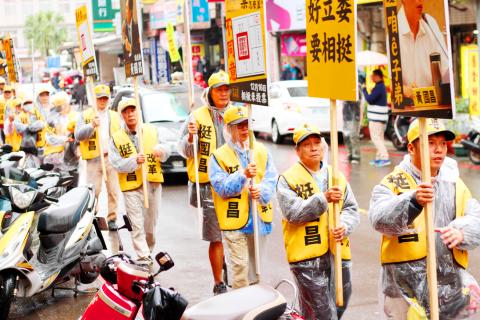Former Academia Sinica president Lee Yuan-tseh (李遠哲) and other former officials yesterday expressed their support for New Power Party (NPP) Executive Chairman Huang Kuo-chang (黃國昌), urging people in his constituency to vote against the lawmaker’s recall tomorrow.
Although his views on many issues might not reflect traditional beliefs, Huang is a legislator with ideals and one who protects the interests of the public, Lee said at a news conference held by the NPP.
Some people blame Huang for supporting same-sex marriage, but the overwhelming majority of people would remain attracted to the opposite sex and this would not be affected by the minority who are not, Lee said.

Photo: Lin Hsin-han, Taipei Times
There are exceptions to the majority’s natural behavior and people should be tolerant of minorities, Lee added.
The Legislative Yuan is a place where controversies in society are fought out, former national policy adviser Rex How (郝明義) said.
Legislators hold a very low position in people’s hearts and many accuse them of only doing their parties’ bidding after they are elected, forgetting the promises they made during their campaigns, How said.
Huang actively pushed for the threshold for recall petitions to be lowered to improve the Legislative Yuan, How said, referring to an amendment to the Civil Servants Election and Recall Act (公職人員選舉罷免法) that was passed last month.
However, after the threshold was lowered, Huang himself became a target for recall, How said.
Former grand justice Hsu Yu-hsiu (許玉秀) said she regretted that people had petitioned to demand a recall election for Huang, when he actively fought for the electorate’s right to do so.
Huang is a hardworking legislator, Hsu said.
How and Hsu urged people to stand up and exercise their right cast a vote against Huang’s recall.
When asked during a radio interview yesterday whether he was confident that he would win the recall election, Huang said that he would not utter the words “I will win.”
Huang said he was 99 percent confident that the recall motion would not pass.
Media have reported that some groups have used ”recall Huang Kuo-chang, punish [President] Tsai Ing-wen (蔡英文)” as a slogan in the campaign to recall Huang.
Huang said he did not believe that he was being “punished” for Tsai’s policies.
The Tsai administration is much better than former president Ma Ying-jeou’s (馬英九) government and it is inappropriate to use such heavy words, Huang said.

Taiwan is stepping up plans to create self-sufficient supply chains for combat drones and increase foreign orders from the US to counter China’s numerical superiority, a defense official said on Saturday. Commenting on condition of anonymity, the official said the nation’s armed forces are in agreement with US Admiral Samuel Paparo’s assessment that Taiwan’s military must be prepared to turn the nation’s waters into a “hellscape” for the Chinese People’s Liberation Army (PLA). Paparo, the commander of the US Indo-Pacific Command, reiterated the concept during a Congressional hearing in Washington on Wednesday. He first coined the term in a security conference last

Prosecutors today declined to say who was questioned regarding alleged forgery on petitions to recall Democratic Progressive Party (DPP) legislators, after Chinese-language media earlier reported that members of the Chinese Nationalist Party (KMT) Youth League were brought in for questioning. The Ministry of Justice Investigation Bureau confirmed that two people had been questioned, but did not disclose any further information about the ongoing investigation. KMT Youth League members Lee Hsiao-liang (李孝亮) and Liu Szu-yin (劉思吟) — who are leading the effort to recall DPP caucus chief executive Rosalia Wu (吳思瑤) and Legislator Wu Pei-yi (吳沛憶) — both posted on Facebook saying: “I

Sung Chien-liang (宋建樑), who led efforts to recall Democratic Progressive Party (DPP) Legislator Lee Kun-cheng (李坤城), was released on bail of NT$80,000 today amid outcry over his decision to wear a Nazi armband to questioning the night before. Sung arrived at the New Taipei District Prosecutors’ Office for questioning in a recall petition forgery case last night wearing a red armband bearing a swastika, carrying a copy of Adolf Hitler’s Mein Kampf and giving a Nazi salute. Sung left the building at 1:15am without the armband and covering the book with his coat. Lee said today that this is a serious

A court has approved Kaohsiung prosecutors’ request that two people working for Democratic Progressive Party (DPP) Legislator Lin Dai-hua (林岱樺) be detained, as a probe into two cases allegedly involving her continues. The request was made on Friday, after prosecutors raided Lin’s two offices and the staffers’ residences, and questioned five on suspicion of contravening the Anti-Corruption Act (貪汙治罪條例). The people included the directors of Lin’s Daliao (大寮) and Linyuan (林園) district offices in Kaohsiung, surnamed Chou (周) and Lin (林) respectively, as well as three other staffers. The prosecutors’ move came after they interrogated Lin Dai-hua on Wednesday. She appeared solemn following